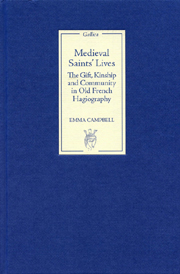Book contents
- Frontmatter
- Contents
- List of Illustrations and Tables
- Dedication
- Acknowledgements
- Abbreviations
- Introduction
- The Gift
- Kinship
- Community
- Manuscripts
- 7 The Campsey Manuscript (London, BL, Additional 70513)
- 8 Oxford, Bodleian, Canonici Miscellaneous 74
- Conclusion
- Tables
- Appendices
- Bibliography
- Index
- Already Published
7 - The Campsey Manuscript (London, BL, Additional 70513)
from Manuscripts
Published online by Cambridge University Press: 05 February 2013
- Frontmatter
- Contents
- List of Illustrations and Tables
- Dedication
- Acknowledgements
- Abbreviations
- Introduction
- The Gift
- Kinship
- Community
- Manuscripts
- 7 The Campsey Manuscript (London, BL, Additional 70513)
- 8 Oxford, Bodleian, Canonici Miscellaneous 74
- Conclusion
- Tables
- Appendices
- Bibliography
- Index
- Already Published
Summary
When considered alongside Latin hagiographic manuscripts of the same period, thirteenth-century vernacular collections incorporating saints' lives can seem comparatively disorganized. As Pamela Gehrke points out, the Latin manuscripts generally conform to certain principles of classification based on criteria such as type of saint or type of collection, whereas French vernacular manuscripts represent alternative methods of classification which seem less constrained by such literary taxonomy. These vernacular collections often vary quite widely in form, ranging from large miscellanies to small collections of religious works. Most collections contain texts that are predominantly religious in tone, although saints' lives are also sometimes found alongside chronicles, romances and chansons de geste. One of the implications of this organizational variability is that the alternative methods of textual selection that one finds in vernacular manuscripts enable them to engage with their readers and listeners by focusing on certain topics or themes. In so doing, such vernacular collections provided their audiences with a codicological mirror that both reflected specific interests and produced an image of a collective body which could have served an interpellative function.
In light of this, the purpose of the next two chapters is to explore how the forms of community described in relation to individual saints' lives in Chapters Five and Six might also apply to the combinations of texts found in certain medieval collections, or recueils. I examined in those chapters how the constitution of community in saints' lives depends on hermeneutic processes that encourage readers to inhabit as well as interpret the text; I also explored some of the queer possibilities of these processes and their implications for the various reading communities of medieval hagiography, past and present.
- Type
- Chapter
- Information
- Medieval Saints' LivesThe Gift, Kinship and Community in Old French Hagiography, pp. 181 - 204Publisher: Boydell & BrewerPrint publication year: 2008



